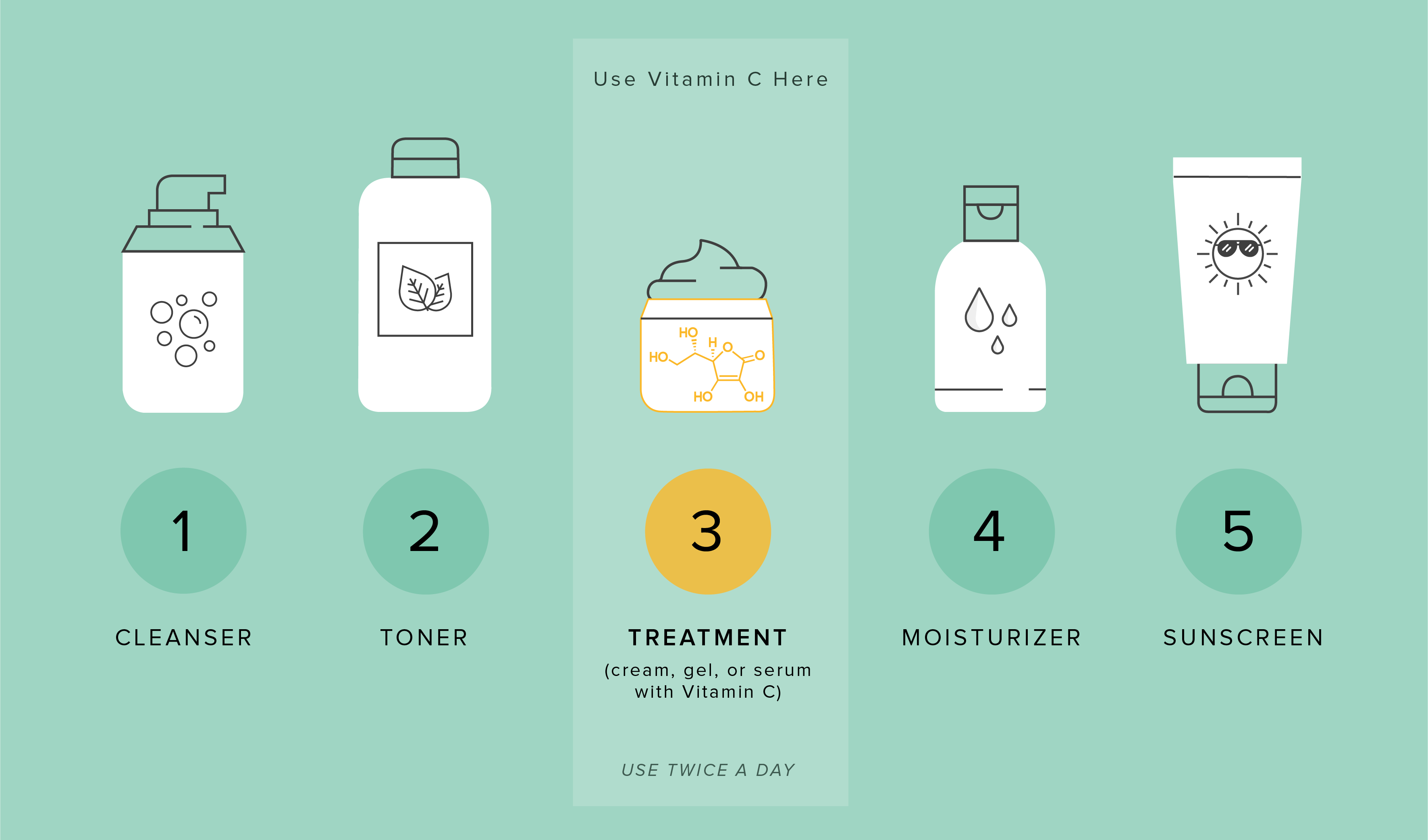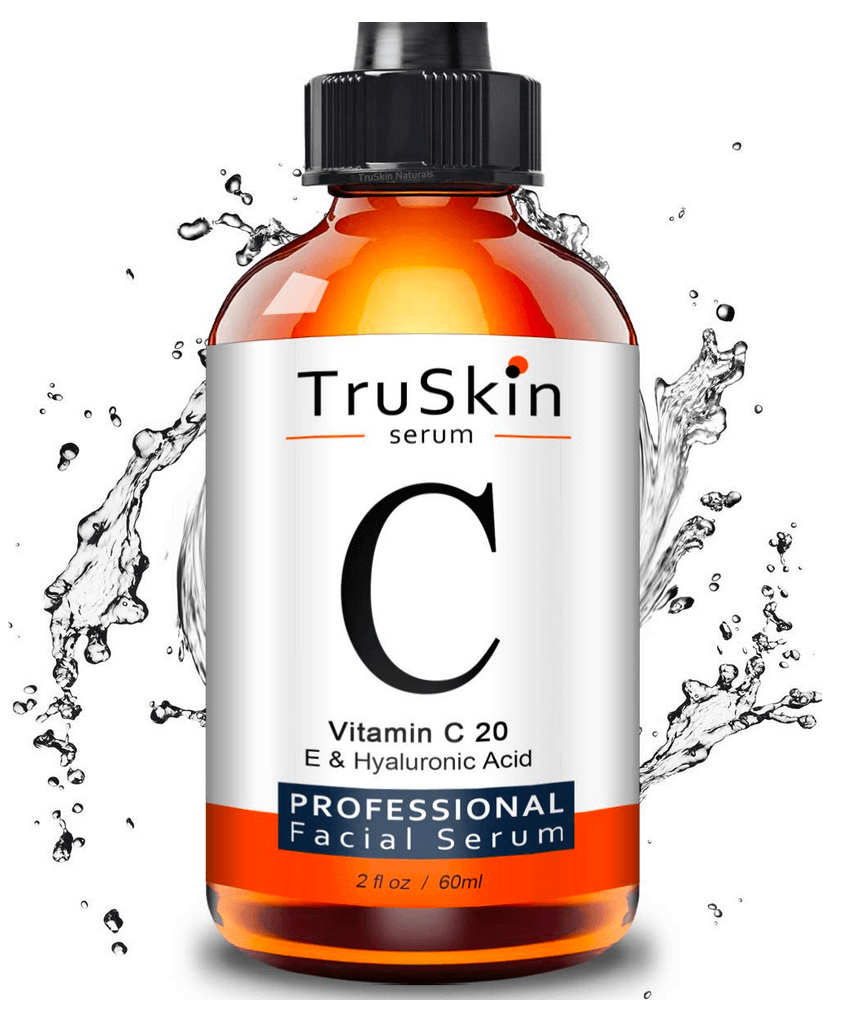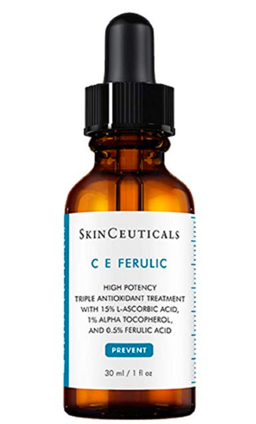Vitamin C Skin Care Benefits:
All You Need to Know
Vitamin C, also known as ascorbic acid, is the ultimate powerhouse of serum ingredients. Not like we're biased or anything, but EVERYONE should incorporate vitamin C into their skin care routine.
Vitamin C benefits the human body in many ways, but for skin care, think of vitamin C as an antioxidant that fights free radicals and facilitates the production of collagen. Commonly known as ascorbic acid, vitamin C is naturally occurring in both the surface and deeper layers of your skin, and when topically applied, vitamin C delivers a variety of anti-aging benefits. Vitamin C does it all: she brightens, she boosts collagen, she fades hyperpigmentation, she fights sun damage, she fights environmental toxins, she reduces redness, and most importantly, she prevents fine lines and wrinkles. She even heals burns (what can't she do). We suggest that everyone (young, old, all skin types) use a vitamin C serum, especially because natural vitamin C levels decrease with age (which directly results in lower collagen levels). Less collagen causes fine lines, wrinkles, and saggy skin. Bleh. All in all, vitamin C is a total package ingredient that will wonderfully benefit all skin types. Vitamin C is the key for brighter, firmer, healthier skin.


Anti-Aging
Brightening
Dark Circles (Pigmented)
Fine Lines & Wrinkles
Hyperpigmentation
Redness


All Skin Types!


Creams/Gels
Eye Creams
Masks
Serums


Over the Counter
Top 6 Vitamin C Skin Care Benefits
✓ Fades Mild Hyperpigmentation
EVENS OUT COMPLEXION
Vitamin C is natural beauty blender that evens out your overall complexion and lightens hyperpigmentation (freckles, sun spots, age spots, acne scars, any other sun damage, etc.). Vitamin C reduces melanin levels (skin pigment levels) by cutting off the supply of what your skin uses to make melanin: tyrosine. Less tyrosine means less melanin, which means --> faded dark spots. Hell yeah. For the record, don't confuse lighten with whiten. Vitamin C will lighten dark spots to match your base skin tone. Vitamin C will not whiten your skin.
✓ Reduces Redness
SOOTHES INFLAMMATION
Vitamin C is an antioxidant with anti-inflammatory properties that reduces redness (as well as mild rosacea and inflammation). Vitamin C also strengthens blood vessels and minimize the appearance of broken capillaries.
✓ Collagen Booster
ANTI-AGING. YES PLEASE.
Vitamin C increases collagen production to maintain firm, bouncy skin. Vitamin C boosts collagen by increasing the production of the amino acids needed to make collagen (glycine, hydroxyproline, and proline). Fun fact: vitamin C not only stimulates new collagen production, but also protects existing collagen in your face (great because we're not trying to let any of our precious collagen go).
✓
Brightens Complexion
GET THE JLO GLOW
Vitamin C brightens complexion (a.k.a reveals your inner, shine bright like a diamond face). We call it the The Vitamin C Glow: the combo of faded hyperpigmentation and pigmented dark circles, reduced redness, and boosted collagen means goodbye to tired, dull skin.
✓ Fights Free Radical Damage
ANTI-AGING. YES PLEASE.
Sparknotes: Vitamin C fights free radical damage with it's antioxidant properties (reminder: free radical damage develops from sun damage, pollution, chemicals, and environmental toxins and causes premature aging like fine lines and wrinkles, sagging, age spots, and at worst, skin cancer...yikes). As an electron donor, vitamin C is able to scavenge and stabilize free radicals in the skin.
Down the rabbit hole: What is free radical damage, actually? Free radicals are unstable cells that are desperate for another electron, and they go full-blown psycho by stealing an electron from literally any cell around it (mr. steal yo electron). If the free radical successfully steals an electron, it's now satisfied and chills out, but the cell it stole from now becomes a free radical itself, and the whole process of molecular damage repeats itself... vitamin C is the peacemaker that comes in with an extra electron and gives that extra electron to a hungry free radical. Vitamin C is a great ingredient to protect for your skin in a world of free radical damage!
✓
Prevents Fine Lines and Wrinkles
ANTI-AGING. YES PLEASE.
Vitamin C prevents fine lines and wrinkles in 2 ways: by protecting against free radicals and by boosting new collagen production/protecting existing collagen from breaking down (remember: the loss of collagen over time is a major cause of fine lines and wrinkles). One (very) sad thing to note...vitamin C cannot remove existing fine lines and wrinkles, but vitamin C can prevent new fine lines/wrinkles from developing prematurely. Prevention is key!
When to Use Vitamin C
SKIN CARE ROUTINE OPTION:
A serum, cream, or gel with vitamin C - apply in the AM for photoprotection against UV rays, and in the PM to fight free radicals while you sleep.

Top 3 Vitamin C Skin Care Products
We’ve put together a GHS curated selection of our favorite skin care products that contain vitamin C (ascorbic acid) for anti-aging, brightening, fading hyperpigmentation, calming redness, and reducing fine lines and wrinkles. We only link to products that we absolutely believe in. All the products we’ve chosen are paraben-free, sulfate-free, and phthalate-free. Remember - results won’t happen overnight. It will take 6-8 weeks of consistent topical use before you begin to see improvements, so stay consistent with your product usage.
Use in AM & PM
Apply this serum to your face, neck, and chest post cleansing, exfoliating, toning, and any AHA or retinol serum.
Price $$
Certified: paraben-free, sulfate-free, phthalate-free, cruelty-free, vegan
Use in AM & PM
Apply this serum to your face, neck, and chest post cleansing, exfoliating, toning, and any AHA or retinol serum.
Price $$$
Certified: paraben-free, sulfate-free, phthalate-free, cruelty-free, vegan, gluten-free
Use in AM & PM
Apply this serum to your face, neck, and chest post cleansing, exfoliating, toning, and any AHA or retinol serum.
Price $$$$
Certified: paraben-free, sulfate-free, phthalate-free
How to Apply Vitamin C

Always patch test before applying to your entire face! Apply small amount of vitamin C product to a small area on your forehead (where your facial skin is thickest). If there is no irritation within 24 hours, apply thin layer of vitamin C product to your entire face.


Vitamin C works best when applied to your entire face (avoid eyes, lips, and mouth) because it fights free radicals and facilitates the production of collagen.


For maximum results, let your vitamin C product fully dry before the next step in your skin care routine. Applying moisturizer immediately after vitamin C can prevent your skin from completely absorbing the vitamin C up.


Pair with vitamin E to fight free radicals. Vitamin C and vitamin E can both fight free radical damage separately, but combining vitamin C and vitamin E actually increases the power/potency of both ingredients (#bettertogether). Why? Vitamin C and vitamin E do more as a team because vitamin C "recharges" vitamin E. Basically, after vitamin E has donated its extra electron to a free radical, vitamin C says, "Hey boo, take my extra electron" to vitamin E; then vitamin E is like, "Hell yeah, now I have another electron to give to another free radical." Additionally, vitamin E can repair damage in the lipid cell membrane (the healthy fat barrier that protects the skin from the outside elements).
Vitamin E is also better absorbed when combined with vitamin C. Vitamin C works best on the surface level, whereas vitamin E is oil-soluble meaning it can go one deeper.


Pair with ferulic acid for solution stability. Vitamin C and ferulic acid are both antioxidants that fight free radical damage, and these ingredients are often combined in serums because ferulic acid strengthens the storage, absorption, and photoprotection of vitamin C.

GHS Tips
Be Consistent
Results won’t happen overnight. Consistency is key. It will take 6 to 8 weeks of consistent topical use before you begin to see significant improvements. Be patient - good things come to those who wait.

Close the Cap with Use
Vitamin C oxidizes on contact with oxygen and light (a.k.a. its chemical makeup changes and as a result it won't be beneficial for your skin anymore). When this happens, the product turns a yellowish-brown color. Put the cap on, and store in a cool, dark place. If you forget and the product is exposed to air for an extended period of time, the hyperpigmentation and anti-aging capabilities of vitamin C will be canceled out.

Look for Ascorbic Acid 👀
Ascorbic acid is the most effective and the most researched form of topical Vitamin C, and studies show that its more effective than any other synthetic derivatives of vitamin C. Why is it the best? Absorption of vitamin C depends on the pH of the solution--more acidic environments (pH 4.0 or less) deliver maximum Vitamin C absorption/benefits. FYI: There are many versions of ascorbic acid:
- Ascorbate phosphate: More stable than ascorbic acid but doesn't absorb as well.
- Ascorbyl palmitate: More stable than ascorbic acid but doesn't absorb as well. Some studies have shown toxic effects.

15% to 20% is Best
The most effective vitamin C skin care products are serums that have a concentration of concentrations of 15% to 20%. These aren’t for everyone - higher vitamin C concentrations can be irritable for those with sensitive skin. Consult your dermatologist if you’re trying a more aggressive approach.

Follow Up With...

Moisturizer
Moisturize 2x a day (morning and night). Vitamin C works hard for your skin, but all that progress can be for nothing if you don't properly hydrate.

Sunscreen
Vitamin C may be able to fight sun damage, but it does not replace the protective effects of sunscreen against damaging UV rays. Limit your time in the sun and apply sunscreen daily.
Safety Tips
Vitamin C (Ascorbic Acid) is Cosmetic Ingredient Review approved and safe for topical in concentrations of up to 20% in skin care products.
SIDE EFFECTS:
for the most part, vitamin C does not cause negative side effects, but on RARE occasions, you may see minor redness or irritation, or yellowish discoloration of the skin
✓ Wear sunscreen!
✓ Close the cap with use
✓ Combine with vitamin E for maximum results (lots of products mix the two)
✓ Eat fruits & veggies high in vitamin C
• Don't use vitamin C serum post a strong exfoliation, microdermabrasion, or chemical peel
FAQs about Vitamin C
Q. Are vitamin C and ascorbic acid the same?
Ascorbic acid is the chemical name for vitamin C and it is the purest form of vitamin C. There are two main types of ascorbic acid: L-ascorbic acid and D-ascorbic acid. There are synthetic, man-made versions of both L-ascorbic acid and D-ascrobic acid, but L-ascorbic acid is also naturally occurring in the human body and in nature (oranges, broccoli, etc.).

Q. Should I apply vitamin C in the morning or at night, or both?
Apply vitamin C day and night UNLESS you're also using AHAs (like glycolic acid or lactic acid) or BHAs (like salicylic acid). If you're using AHAs or BHAs in your skin routine, apply vitamin C in the morning only, and apply AHA/BHA at night only.

Q. Do vitamin C serums expire?
Yes, vitamin C serums expire. If the product turns a yellow-brownish color, it's done. Throw it away, and get a new one. Vitamin C expires when it oxidizes, and the molecular change strips away vitamin C's skin care super powers. Prolong the shelf life of your vitamin C by storing in a cool, dark place.

Q. What causes vitamin C serums to turn yellow/brown?
Vitamin C turns yellow/brown when it oxidizes (ick). Vitamin C oxidizes when it reacts with oxygen, and this reaction actually alters the chemical makeup of vitamin C (sadly, it changes it for the worse...oxidized vitamin C becomes dehydroascorbic acid and will no longer deliver Vitamin C's wonderful skin care benefits). Long story short, oxidized, yellow-brown vitamin C belongs in the trash. FYI, vitamin C oxidizes when it comes into contact with air, sunlight, and heat. To extend the shelf-life of your vitamin C product, store it in a cool, dark place.

Q. Does vitamin C serum really lose potency after it turns yellowish-brown? Should I throw out my vitamin C product after it turns yellowish-brown?
Yes, yes, yes, throw that yellow-brown serum away. The darker the color, the less effective the vitamin C is. A yellowish-brown color is a sign that your vitamin C serum has oxidized. When vitamin C oxidizes, it turns into dehydroascorbic acid, and no longer benefits your skin. See an example of expired vitamin C serum (the darkest yellow drop is the bad Vitamin C).

Q. What is the difference between vitamin C and vitamin E?
Like vitamin C, vitamin E is also an antioxidant meaning both vitamins fight free radical damage caused by UV rays, toxins, pollution, and environmental damage. Where they differ (in a big way) is vitamin C is water-soluble (great for all skin types) whereas vitamin E is oil-soluble (oily and acne prone, beware). Another difference is how the two combat free radicals. Vitamin C can donate electrons to multiple free radicals, but vitamin E is a one and done--when it gives its extra electron to a free radical, it can’t give to another free radical in need of some electron TLC. BUT, when used together, vitamin C can reinforce used up vitamin E by replenishing these babies with another electron to give away and keep on going (and going and going like an energizer bunny free radical fighter).

Q. Can I use vitamin C with retinol?
Yes! In fact, vitamin C and retinol not only pair well, but vitamin C has recently been shown to increase the effectiveness of retinol. Additionally, combining vitamin C, vitamin A (retinol), and vitamin E under sunscreen, has been shown to increase defense against UV damage.

Q. Can I use vitamin C with AHAs like glycolic acid, or BHAs like salicylic acid?
This is a weird one. Yes, you can, BUT you will get better results if you use vitamin C and glycolic acid/salicyclic acid separately. We recommend using vitamin C in the morning and your AHA or BHA at night.
Why? It all has to do with altering the pH of vitamin C products. Vitamin C serums (usually formulated with vitamin C derivatives like ascorbic acid or L-ascorbic acid) are typically formulated as acidic, low pH products to deliver maximum skin care benefits. When combined with other acidic products (AHAs like glyocolic acid or BHAs like salicylic acid), the pH of the vitamin C serum can change causing the overall product to be less effective. So yes, you can use vitamin C and AHAs/BHAs at the same time, but you won't be getting the full benefits of your vitamin C. FYI, there are some products that combine vitamin C with AHAs, but we recommend using these ingredients separately: use vitamin C in the morning and your AHA/BHA at night. We suggest using the AHA/BHA at night because hydroxyacids make your skin extra sensitive to UV rays.

Q. What are common brand names used to identify vitamin C on an ingredient list for skin care products?
- Vitamin C
- Ascorbic Acid
- ascorbyl palmitate
- ascorbyl magnesium phosphate
- ascoryl glucoside
- ascorbyl linoleate
- sodium ascorbyl phosphate
- retinyl ascorbate
- tetrahexyldecyl ascorbate
- magnesium ascorbyl phosphate
- D-ascorbic Acid
- L-ascorbic Acid
- Vitamin C Ester

Related Pages
How to Fade Dark Spots - Causes, Treatments, & Top Ingredients
10 Best Products for Fading Dark Spots
10 Best Cruelty-Free Products for Fading Dark Spots
How to Reduce Dark Circles - Causes, Treatments, & Top Ingredients
10 Best Products for Reducing Dark Circles
10 Best Cruelty-Free Products for Reducing Dark Circles
How to Treat Fine Lines & Wrinkles - Causes, Treatments, & Top Ingredients
10 Best Products for Preventing Fine Lines & Wrinkles
10 Best Cruelty-Free Products for Preventing Fine Lines & Wrinkles
Want More GHS Tips?
It’ll be the best thing to ever slide into your DM's.


